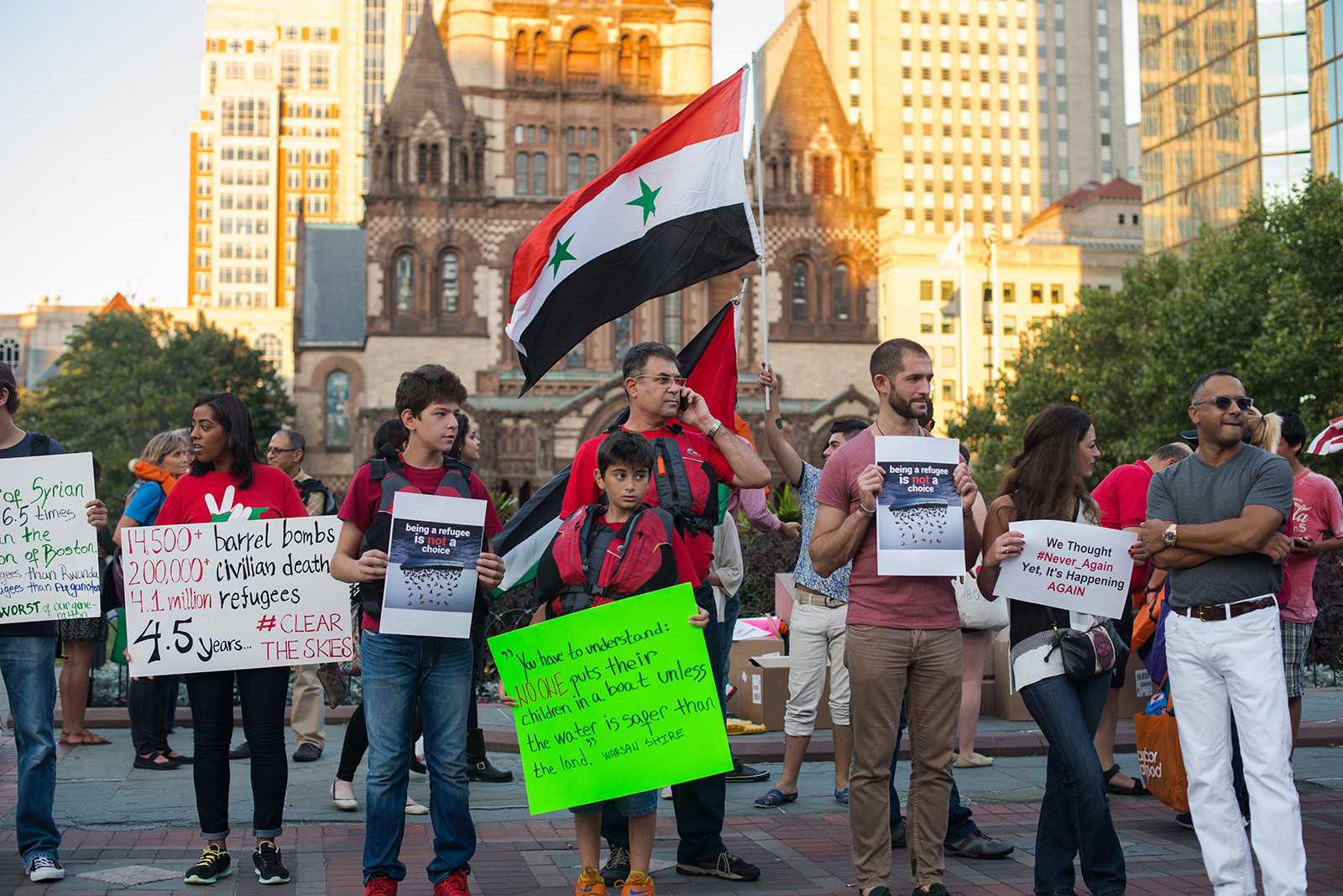[mediagrid cat=”21775″]
More than 200 people gathered in Copley Square Saturday for a candlelight vigil for Syrian refugees, organized by the political group Boston Solidarity.
While the U.S. President Barack Obama has pledged to take in 10,000 Syrian refugees by next year, participants came to show solidarity with the growing number of Syrians that have been forced out of their country.
Omar Salem, a co-organizer of the vigil and South Shore resident of 18 years, welcomed the crowd with an opening statement about how Syrian refugees are welcome into Massachusetts.
“We ask our leaders to allow 100,000 refugees into the United States by 2016,” Salem said. “To allow only 1,500 Syrian souls is shameful and immoral. We are gathered to call for the war to unite and address both [Bashar al-] Assad and [the Islamic State group] before Syria is empty from its people … Let us be one hand to help those refugees who are arriving to our state.”
Secretary of State John Kerry announced Sunday that the United States would take in 100,000 refugees by 2017.
Salem said the purpose of the vigil was to show that the refugee crisis has grown “extremely out of proportion.”
“We need people to realize that this is not a European problem, this is not a Middle East problem, this is a world problem,” Salem told the crowd.
Salem ended his speech with a quote from Icelandic author and professor Bryndis Bjorgvinsdottir, highlighting the important role refugees play.
“Refugees are human resources, experience and skills. Refugees are our future spouses, best friends, our next soul mate, the drummer in our children’s band, our next colleague, Miss Iceland 2022, the carpenter who finally fixes our bathroom, the chef in the cafeteria, the fireman, the hacker and the television host. People who we’ll never be able to say to: ‘Your life is worth less than mine.’”
Following Salem’s speech, musician Avi Salloway led the crowd in singing “Amazing Grace”, “This Land is Your Land” and an original song, all of which were modified to reflect the ongoing crisis.
Participants clapped to the music, waving the candles the organizers had distributed.
Some attendees held signs bearing quotes, statistics and pictures of the refugee crisis.
One sign said, “4 million refugees … Can’t we help more than 0.0025 percent?” while another read, “You have to understand, no one puts their children in a boat unless the water is safer than the land.”
The largest sign, held by 11 people, said, “We the people of Boston welcome Syrian refugees.” Many attendees also wore orange life vests in an effort to mimic recent images in the media of refugees attempting to cross the Mediterranean Sea into Europe.
Co-organizer Mohamad Al Bardan, who moved from Syria to Boston five years ago, shared a similar perspective with the crowd.
“I grew up in Syria, so I know what our people are facing, and why our people are leaving,” Al Bardan told The Daily Free Press. “I hope this event helps people gain sympathy for the cause, but I also hope more people understand the root issue.”
Al Bardan addressed the international urgency of the problem and called on the crowd to do the same.
Attendees came from various backgrounds, with many from Syrian descent and others who said they had been touched by the recent coverage of the crisis.
Mostafa Heyama, 47, of Roslindale, said that coming from Cairo, Egypt, and witnessing firsthand the brutality of an Arab regime, he wanted to show support for this cause.
“If the citizens of the country revolt, there are no boundaries for the government, they have nothing stopping them from using the most brutal tactics,” he said. “We need to look at humanity and ask what is happening that we cannot help more people.”
Heyama’s wife, Susan McEwen, 63, also of Roslindale, said she believes that religious barriers can cause issues for refugees.
“There is so much xenophobia and Islamophobia in Europe and America that Syrian refugees are subject to greater scrutiny than most,” she said. “It’s hard for me to see Arabs as ‘other’ and I think that the amount of otherness people see when they look at Syrian refugees is creating a problem.”
























































































































Billy • Sep 21, 2015 at 11:37 am
Four out of five migrants are NOT from Syria
http://www.dailymail.co.uk/news/article-3240010/Number-refugees-arriving-Europe-soars-85-year-just-one-five-war-torn-Syria.html